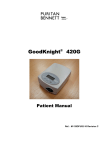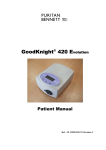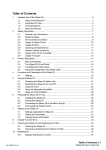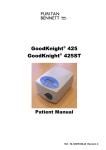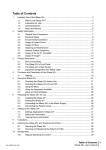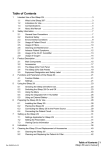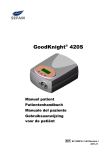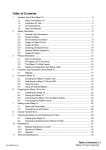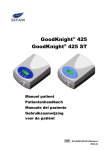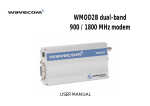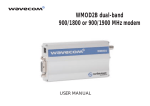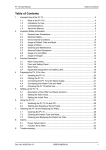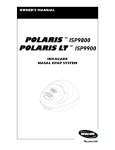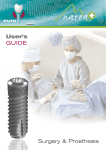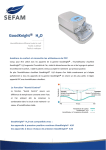Download Goodknight 420S User Manual
Transcript
GoodKnight® 420S Patient Manual Ref. : M-139DFU02-30 Revision C Revision C List of patient manual revisions GoodKnight® 420S The pages below are included in the American version of the GoodKnight® 420S patient manual Ref. M-139DFU02-30 revision C. Current pages Revision Cover C List of revisions C Table of contents A Introduction C 1 – 8 ; 11 – 20 A 9 – 10 ; 21 B 22 C Reference or revision Description Date M-139DFU02-30 revision A. Creation of the manual. February 2002 Revision B. Modification of the manual (sections “Installing a humidifier” and “Electrical characteristics of the power supply module”) October 2003 Revision C. Modification of the manual (Implementation of the CE-mark in the section “Symbols and Nellcor Puritan Bennett trademark) July 2005 © 2002 − 2005 Nellcor Puritan Bennett Inc. All rights reserved. ii GoodKnight 420S – Patient Manual Revision C The Puritan Bennett GoodKnight® 420S device (GK420S) is intended for treating patients with Sleep Disordered Breathing including Obstructive Sleep Apnea Syndrome (OSAS). The main characteristic of this pathology is the occurrence of multiple respiratory events caused by contraction of the upper airways, that disturb sleep. The GoodKnight 420S delivers Continuous Positive Airway Pressure (CPAP) that prevents the upper airways from becoming obstructed, thus eliminating apneas. It is essential for you to understand the use of this device. Therefore, please read this manual carefully before using the GoodKnight 420S. The information contained here is intended to help you use this device under optimum conditions of safety and operation. For any question relating to the equipment and its use, contact your medical team or your home care provider. Your doctor has decided on the treatment of your illness. He or she has prescribed the different parameters that the hospital or your home care provider will program for you. The home care provider will adjust these parameters, as needed. CAUTION Federal (U.S.A.) law restricts this device to sale by or on the order of a physician. GoodKnight® is a registered trademark of Nellcor Puritan Bennett Inc. GoodKnight 420S – Patient Manual iii This page is left blank intentionally iv GoodKnight 420S – Patient Manual Revision A TABLE OF CONTENTS BEFORE STARTING ..............................................................................................................................................1 SAFETY INSTRUCTIONS................................................................................................................................................... 1 INDICATIONS FOR USE .................................................................................................................................................... 2 PRECAUTIONS FOR USE................................................................................................................................................... 2 MODEM TRANSMISSIONS ................................................................................................................................................ 2 CHECKING THE COMPONENTS......................................................................................................................................... 3 DESCRIPTION OF THE GOODKNIGHT 420S ......................................................................................................4 INSTALLATION ......................................................................................................................................................7 STANDARD INSTALLATION ............................................................................................................................................. 7 FITTING AN OXYGEN ADAPTOR ....................................................................................................................................... 8 INSTALLING A HUMIDIFIER ............................................................................................................................................. 9 INSTALLING AN EXTERNAL BATTERY ........................................................................................................................... 10 USE .......................................................................................................................................................................11 STARTING TREATMENT................................................................................................................................................. 11 STOPPING TREATMENT ................................................................................................................................................. 12 USING THE RAMP .......................................................................................................................................................... 12 USING THE GOODKNIGHT 420S TO ACCESS INFORMATION .......................................................................................... 14 SETTING THE TIME........................................................................................................................................................ 15 MAINTENANCE AND CLEANING INSTRUCTIONS ...........................................................................................17 GOODKNIGHT 420S ..................................................................................................................................................... 17 AIR INLET FILTERS ....................................................................................................................................................... 17 HOSE ............................................................................................................................................................................ 17 INTERFACE ................................................................................................................................................................... 18 HUMIDIFIER ................................................................................................................................................................. 18 OXYGEN ADAPTOR ....................................................................................................................................................... 18 TROUBLESHOOTING ..........................................................................................................................................19 TECHNICAL SPECIFICATIONS ..........................................................................................................................21 GOODKNIGHT 420S PERFORMANCE ............................................................................................................................. 21 PHYSICAL CHARACTERISTICS ....................................................................................................................................... 21 STORAGE CONDITIONS ................................................................................................................................................. 21 CONDITIONS OF USE ..................................................................................................................................................... 21 DISPOSAL OF THE GOODKNIGHT 420S AT THE END OF ITS LIFE .................................................................................... 21 ELECTRICAL CHARACTERISTICS OF THE POWER SUPPLY MODULE................................................................................. 22 ELECTRICAL CHARACTERISTICS OF THE DEVICE ........................................................................................................... 22 SYMBOLS ..................................................................................................................................................................... 22 GoodKnight 420S – Patient Manual v This page is left blank intentionally vi GoodKnight 420S – Patient Manual Revision A BEFORE STARTING Safety instructions In order to ensure the appropriate use your GoodKnight® 420S* device, please read all the information contained in this operator manual. Pay special attention to the passages proceeded by the following terms: WARNING Indicates a potential risk of death or accident to you or caregiver. CAUTION Information to avoid damaging equipment or losing data. NOTE Tips for ease of use of the GoodKnight 420S device. WARNINGS 1. Before you use the GoodKnight 420S, examine it as specified in the chapter, “Checking the components.” (See page 3.) 2. If you need an additional supply of oxygen for the patient, observe all safety instructions for using oxygen, which appear in the chapter “Starting treatment.” (See page 11.) 3. Only use the accessories that have been given to you by your home care provider. Check that you do have the instructions for using each of these accessories and read through them. 4. Use only the specific power supply module provided with the device. 5. Do not use the device in the presence of flammable fumes. 6. Follow the GoodKnight 420S’s installation instructions as specified in the chapter, “Installation” (See page 7.). In particular, keep the device away from any sources of water. 7. Do not accidentally or intentionally obstruct the air outlet or any other opening in the device or in the respiratory circuit. 8. Do not introduce liquids or objects into the air outlet. 9. If you experience any of the following symptoms when you use the GoodKnight 420S, discontinue use and contact your home care provider: dryness in your nose and airways; skin sensitivity; runny nose; earache; sinus trouble; daytime drowsiness; mood changes; disorientation; irritability; or, memory loss. 10. Contact your home care provider in the event of any malfunction in the GoodKnight 420S. Maintaining this equipment is the sole responsibility of an authorized home care dealer. Do not attempt to open the device. 11. The air flow produced by the GoodKnight 420S can be as much as 7°F higher than the room temperature. Exercise caution if the room temperature is warmer than 90°F. *The GoodKnight® 420S Nasal CPAP (Continuous Positive Air Pressure) system is a home care device for patients with Sleep Disordered Breathing. Throughout this manual, this device is referred to as the “GoodKnight 420S.” GoodKnight 420S – Patient Manual 1 Revision A Indications for use The GoodKnight 420S is indicated for use in treating obstructive respiratory sleep disorders, particularly Obstructive Sleep Apnea (OSA) in spontaneously breathing patients weighing over 66 lbs (30 kg) within a homecare and hospital environment. Precautions for use Clinical research indicates that CPAP therapy may be contraindicated for patients with any of the following pre-existing conditions: • • Extremely low blood pressure Pneumothorax or pneumomediastinum (collapsed lung/air trapped in the lung tissue or in the tissue between the lungs) Severe bullous emphysema or previously complicated by pneumothorax Massive epistaxis or previous massive epistaxis (nose bleed) Decompensated cardiac insufficiency or hypotension, especially in case of depletion in blood volume or cardiac rhythm disorder (inadequate blood pressure) Pneumoencephalus (air trapped around the spinal cord), traumatism, or recent surgery with the after-effect of a cranio-nasopharyngeal fistula (abnormal opening between head, nose, and throat) Acute sinusitis (inflammation of the sinus cavity), otitis media (earache), or perforation of the tympanic membrane (eardrum) Severe claustrophobia (fear of being shut up in a confined space) • • • • • • Modem transmissions When it is time to review the information stored on your GoodKnight 420S, your home care provider may set up a modem connection, which is a telephone communication device. The modem translates computer signals into telephone signals that are sent and converted to computer data that will be reviewed with special software. NOTE Your home care provider will set up the modem connection, and instruct you on how to use it. 2 GoodKnight 420S – Patient Manual Revision A Checking the components To use the GoodKnight 420S with its specific electrical power supply, you must have the following items at least: • A patient tubing enclosing a second small transparent tube • A nasal mask and all related accessories as specified in the instructions for using this interface. In addition to these accessories, your doctor may have prescribed the use of a humidifier. In this case, ensure that you have all of the accessories for this humidifier, as specified in its operating instructions. In the event that an additional oxygen supply is needed, you must also have an adaptor (but only in cases where the oxygen supply is not fitted directly onto the interface). See the chapter “Fitting an oxygen adaptor” (See page 8). Carefully examine the GoodKnigt 420S and each accessory. Check the hoses for damage. The interface should not have any cracks or distortion in the cup and bellows (part of the mask coming in contact with the face). Verify that the device and the specific power supply module have no external damage and that there is no obvious default. Connect the device to the mains using the power supply module, and refer to steps 4 and 5 of the chapter “Standard installation” (See page 7). The type of the device is displayed for a few seconds then the following standby screen showing the hour (the value displayed is given as example) ; the device’s display should show the time in the 24 hour format: 13:34 (the two points are blinking). Standby Indicator Figure 1 – View of the display when the device is in standby mode If the device was disconnected while it was running, the screen displays the pressure. The device shows the same mode as at the time of the power supply cord disconnection and is set on the pressure used at the time of disconnection. Start the device by pressing the ON/OFF button. (See reference 4 in Figure 2, page 5). The motor should start up and the noise should be regular. To stop the device, press the ON/OFF button and unplug the power supply lead from the mains. WARNING In the event of problems or if you discover any anomaly, do not start the treatment and contact your home care provider. GoodKnight 420S - Patient manual 3 Revision A DESCRIPTION OF THE GOODKNIGHT 420S The GoodKnight 420S is powered from an external power supply and equipped with specific accessories. The device is described below. See figures 2, 3 and 4 on page 5. 1. Display Shows various kinds of information such as the pressure delivered, the settings of the device or the time. For further details, refer to the chapter “Using the GoodKnight 420S to access information” (See page 14). 2. Information Access button Used for accessing various kinds of information regarding the device. For further details, refer to the chapter “Using the GoodKnight 420S to access information” (See page 14). 3. Ramp button Used for starting or stopping the pressure increase ramp. For additional information, refer to the chapter “Using the ramp”. (See page 12). It is also used to decrease the value of the parameters during the device settings. 4. ON/OFF button Used for switching the device on or off. It is also used to increase the value of the parameters during the device settings. 5. Pressure port This is the connector onto which the small hose is connected. For additional information, refer to the chapter “Installation”. (See page 7). 6. Outlet connector This is the air outlet onto which the large hose is connected. For additional information, refer to the chapter “Installation”. (See page 7). 7. Serial communication connector This connector is intended for use solely by your physician or your home care provider. Do not connect it to anything. 8. Supply connector Used for powering the device from the specific power supply module or from an external battery. For additional information, refer to the chapter “Installing an external battery”. (See page 10). 9. Air inlet filters These filters prevent dust from entering the device and its airways. For additional information, refer to the chapter “Maintenance and cleaning instructions”. (See page 17). 4 GoodKnight 420S – Patient Manual Revision A The items in the Figures below are described on page 4. 1 2 4 Figure 2 – Top view 3 6 5 Figure 3 – General view 7 8 9 Figure 4 – Rear view GoodKnight 420S - Patient manual 5 This page is left blank intentionally 6 GoodKnight 420S – Patient Manual Revision A INSTALLATION This chapter shows you how to connect the various accessories and cables to your GoodKnight 420S. Before beginning the installation, examine your device and its accessories. Refer to the chapter, “Checking the components.” (See page 3.) CAUTION When you are ready to use the GoodKnight 420S, place it on a stable surface. Avoid placing it too near a wall or any other obstacle that could hamper the intake of air into the device. Standard installation 1. Connect the patient tubing to the device. To do this, connect the small tube that emerges through one of the large ends of the spiral hose, to the pressure port. (See reference 5 in Figure 3, page 5). Connect the large end of the spiral hose onto the outlet connector of the device (See reference 6 in Figure 3, page 5). Figure 5 – Connection of the spiral hose to the device WARNING Do not twist or kink the small pressure tube. 2. 3. 4. Prepare the patient interface as described in its instructions for use. Connect the interface to the patient tubing free end. Connect the cable of the power supply module to the supply connector located on the back of the device. (See reference 8 in Figure 4, page 5). CAUTION 5. Use only the specific power supply module provided with the device. Connect the plug of the power supply module to the electrical outlet. The type of the device is displayed for a few seconds then the following standby screen showing the hours and the minutes in 24 hour format: 8:22 The two points are blinking. 6. The device is ready to operate. Refer to the chapter “Use”. (See page 11). GoodKnight 420S - Patient manual 7 Revision A Fitting an oxygen adaptor Substitute the following step for step 1 of the standard installation procedure: • Connect the oxygen adaptor onto the device’s outlet connector and connect the other end of the adaptor onto the large end of the patient tubing. (See Figure 6). Connect the small tube that emerges through one of the patient tubing large ends to the pressure port. (See reference 5 in Figure 3, page 5). Figure 6 – Connecting the oxygen adaptor to the device To continue installing the equipment, proceed to steps 2 through 6 of the standard installation. WARNINGS • Always follow the instructions of your physician and home care provider in the event of using oxygen. • Do not smoke in the presence of oxygen. • Do not inject oxygen through the air inlet of the GoodKnight 420S. • Carefully follow the start-of-treatment and end-of-treatment steps as described in the chapter, “Use.” (See page 11.) • If supplemental oxygen is used, the oxygen flow must be turned off when the GoodKnight 420S is not operating. If the oxygen flow is left on when the device is not operating, oxygen delivered to the interface circuit may accumulate within the GoodKnight 420S. Oxygen accumulated in the device could create a fire hazard. CAUTION If the supplemental oxygen flow rate is fixed, the inhaled oxygen concentration will vary, depending on the pressure settings, patient breathing pattern, interface selection, and the leak rate. 8 GoodKnight 420S – Patient Manual Revision B Installing a humidifier Refer to the humidifier instructions for additional information on assembly and safety precautions. WARNING The humidifier must be filled with distilled water before being connected to the GoodKnight 420S. CAUTION In order to avoid water damage, make sure that the humidifier is always placed lower than the GoodKnight420 S unit. Substitute the steps below for step 1 of the standard installation procedure: 1. Connect one of the ends of the short humidifier hose onto the outlet connector of the device. (See reference 6 in Figure 3, page 5). 2. Connect the other end of the short humidifier hose onto one of the humidifier’s connectors. Steps 1 and 2 Steps 3 and 4 Figure 7 – Connecting the humidifier to the device 3. 4. Connect the small tube that emerges through one of long patient tubing ends to the pressure port. (See reference 5 in Figure 3, page 5). Connect this same end of the long patient tubing onto the humidifier’s second connector. Figure 8 – View of the humidifier connected to the device You can then repeat steps 2 through 6 of the standard instructions for installing the equipment. GoodKnight 420S – Patient Manual 9 Revision B Installing an external battery The GoodKnight 420S can be powered by a 12-Volt battery by using a optional cable provided for this purpose. CAUTION • Do not use any battery power cable other than that supplied with the GoodKnight 420S. There is a risk of damaging the device and your battery if you use unapproved accessories. • Use only 12-Volt DC sources and ensure that the polarity connections (+ and -) are correct. The device can be used for 8 hours at least with a fully charged car battery in normal operation conditions. To install the battery cable, substitute the following steps for steps 4 and 5 of the standard installation procedure: 1. Connect the battery power cable onto the supply connector located on the back of the GoodKnight 420S. (See Figure 4, page 5). 2. Connect the other end of the cable directly onto the battery. NOTE Before using the battery, always be sure it is fully charged. The GoodKnight 420S can be powered through a vehicle cigarette lighter by using the cable provided for this purpose. To do so, replace steps 4 and 5 of the standard installation by the following steps: 1. Connect the battery power cable onto the supply connector located on the back of the GoodKnight 420S. (See Figure 4, page 5). 2. Connect the other end of the cable directly onto the cigarette lighter-plug. 10 GoodKnight 420S – Patient Manual Revision A USE This chapter shows you how to use the GoodKnight 420S after installing it as described in the previous chapter. It also shows you how to use the pressure increase (ramp) function and how to access information on settings. (You will not be able to alter these settings, only view them.) WARNING In the sections, “Starting treatment” (page 11) and “Stopping treatment” (page 12), follow the instructions carefully. The instructions must be followed in order, or an accident could occur, especially when oxygen is involved. Starting treatment Once the GoodKnight 420S has been properly installed, follow these instructions: 1. Start the device by pressing the ON/OFF button. The display shows the pressure available as well as the operation and compliance indicators. (See Figure 9). Compliance operation indicator - 1 : compliance is on - 0 : compliance is off 10.0 0 cmH2O Device operation indicator Figure 9 – View of the display when the device is running NOTES • The pressure unit displayed (hPa or cmH2O) can be modified by the Practitioner. • The compliance operation indicator is only displayed after the GoodKnight 420S has been 2. operating for 15 minutes. Put the patient interface (nasal mask) in place according to the instructions for use. If an interface with exhalation vent is used, it includes a hole by which the exhaled gases will be flushed and could not be rebreathed. If an interface without exhalation vent is used, your Homecare Provider must provide you with an adaptor allowing gases flushing as close as possible to the nose. Breathe normally with your mouth closed. WARNING 3. 4. A patient interface with hose should not be worn, unless the CPAP device is turned on and operating properly. The vent hole(s) associated with the interface should never be blocked. This CPAP device is intended to be used with interfaces (or connectors) that have vent holes to allow a continuous flow of air out of the interface. When the CPAP device is turned on and is functioning properly, fresh air from the CPAP device flushes the exhaled air out through the interface vent hole. However, when the CPAP device is not operating, adequate fresh air will not be provided through the interface, and exhaled air may be rebreathed. Rebreathing exhaled air for longer than several minutes could, in some circumstances, lead to suffocation. If you are using a heated humidifier, turn it on according to the instructions for use. If you are using oxygen, open the flow now. GoodKnight 420S – Patient Manual 11 Revision A CAUTION • When the device is in operation mode, check that it delivers an air flow. If the device is not properly operating, stop it immediately and contact the home care provider. At lower CPAP pressures, the flow through the exhalation port may be inadequate to clear all exhaled gas from the hose. Some rebreathing may occur. • Stopping treatment When the GoodKnight 420S is operating, follow the instructions below to discontinue the treatment: 1. If you are using oxygen, stop the flow now. 2. Remove the interface (nasal mask). 3. If you are using a heated humidifier, turn it off according to the instructions for use. Disconnect the humidifier from the unit. CAUTION 4. Do not leave the humidifier connected to the unit or to the tubing when the humidifier is not in use, as humidity could enter the device or the sensing line and degrade device performance. Turn the device off by pressing the ON/OFF button. The device will return to standby mode and display the following standby screen showing the time: 7:54 CAUTION Check that no humidity appears in the tubing, particularly in the sensing line. If so, let the tubing dry before you use it again. Using the ramp First of all adjust the starting ramp pressure of your GoodKnight 420S device by observing the following instructions: NOTE If the ramp time is set to zero, this adjustment is not possible, since the pressure settings are not accessible. The initial ramp pressure can be set to a value between 4 cmH2O and the pressure level prescribed by your physician. This function allows you to set the appropriate pressure level to enable you to fall asleep. To access the parameter setting menu, just press for a second the Information Access button, whether the device is on standby on in operation. (See Figure 10.) Increases the starting ramp pressure Reduces the starting ramp pressure Information access button 12 Figure 10 – View of the control buttons GoodKnight 420S – Patient Manual Revision A Then, in order to scroll through the settings, continue to press the Information Access button, the number of times required for displaying the screen below: 4.0 cmH2O vP The starting ramp pressure value can then be changed by using the ON/OFF key (up) and Ramp key (down). The ramp function enables gradual increases in the delivered pressure. The pressure level may be decreased at nightfall to help you to fall asleep. You can also use this function if you have to get up during the night and have difficulty going back to sleep. The pressure rise time up to the final pressure is prescribed by your physician and the setting carried out by your home care provider is between 0 (no progressive rise) and 30 minutes, in 5-minute increments. The ramp may have been preset to 0, according to your physician’s prescription. In this case, the ramp function is disabled, and pressing the Ramp button on the front panel of the GoodKnight 420S has no effect. (See reference 3 in Figure 2, page 5.) 1. 2. To start the ramp, just press the ramp button when the device is on. The pressure will decrease to a low set value, then increase progressively up to the prescribed pressure level, so you won’t be awakened. The device will run normally, delivering a treatment pressure throughout the night, unless you press the Ramp button again, in which case the pressure will drop down again to the ramp level that you have selected. To end the ramp, press the Ramp button again, and the function will be discontinued. It is possible to reset the ramp time by reactivating the ramp function (the ramp indicator lights up when this is activated). Pressure Pmax Pressure level Starting ramp pressure Pmin Pressure rise time Pressure rise time Time Resetting the ramp Start-up and RAMP function active Figure 11 – Changes in pressure over time when activating the ramp function GoodKnight 420S - Manuel patient 13 Revision A Using the GoodKnight 420S to access information The display enables you to view the information on the settings of the GoodKnight 420S. (See reference 1 in Figure 2, page 5). The setting information is accessible whether the device is on standby or in operation. To access this information, just press the Information Access button for one second. (See reference 2 in Figure 2, page 5.) You will access additional data each time you press the key. Only those settings that display the symbol are changeable in this mode of access. NOTE In the following screens, the device is shown in operation mode and all the values are given as a guide only. Press for one second on Information Access button 10.0 • The pressure level set by your physician (corresponding to min • The ramp time prescribed by your physician (period of time P Press Information Access button 10 Press Information Access button 7.0 cmH2O P Press Information Access button 215 Press Information Access button 155 Press Information Access button cmH2O Id *.* h the pressure prescribed when the device is operating). over which the pressure gradually increases from the starting ramp pressure to the pressure level). • The starting ramp pressure (pressure level at the beginning of ramp); this parameter is adjustable and visible only if the ramp time is not “0”. The symbol shows that the parameter is adjustable. You can increase or lower the value set by using the ON/OFF (up) key or Ramp key (down). For further details, refer to the chapter “Using the ramp”. (See page 12). • The hour meter value (device operating time). The hourglass symbol stands for “time”. h • The compliance meter value (time during which the patient has breathed with the device). Hourglass and human symbols stand for “patient time”. • The GoodKnight 420S on-board software version. Press the Information Access button again to exit the parameter setting menu. 14 GoodKnight 420S – Patient Manual Revision A The display will again show one of the following two screens indicating the status of your device (the values are given as examples). 8:22 10.0 cmH O 2 1 The device is on standby. The device is running. NOTE Exit from the parameter setting menu takes place automatically when you do not press any key for 30 seconds. Setting the time You can set the time only when the device is on standby. To do so, just press and hold the Ramp button for one second. (See reference 3 in Figure 2, page 5). Then while continuing to hold the Ramp button down, press the ON/OFF button. (See reference 4 in Figure 2, page 5). If you release the pressure on the buttons, the symbol of adjustment appears under the time, as shown on the next screen: 15:34 h NOTE The time will only be displayed in a 24-hour format. Thus, 15:34 represents 3:34 P.M. The letter h indicating the hour blinks, you can then set it using the Ramp and ON/OFF keys. To set the minutes, just press the Information Access button, the symbol of minutes blinks in its turn and you can set the time by following the same procedure as you did for hours. Press the Information Access button again to exit the menu. NOTE Exit from the parameter setting menu takes place automatically when you do not press any key for 30 seconds. GoodKnight 420S - Manuel patient 15 This page is left blank intentionally 16 GoodKnight 420S – Patient Manual Revision A MAINTENANCE AND CLEANING INSTRUCTIONS In order to ensure that you use your GoodKnight 420S safely and efficiently, please observe the maintenance instructions specified below. GoodKnight 420S The hard plastic case protecting the internal components of the GoodKnight 420S does not require any special maintenance. When necessary, clean the device by using a soft cloth dampened with warm soapy water. Dry the device thoroughly. WARNINGS • Always unplug the GoodKnight 420S before cleaning it. • Do not use a spray cleaner. This is because residues may lodge in the air outlet, the foam filter, or inside the device. This can cause irritation of the airways. • Do not submerge the device in water. • Do not allow water to run onto the GoodKnight 420S, or drip into any of its openings. • Never use the GoodKnight 420S without verifying that the filter has been installed. Air inlet filters Change the filters as soon as they become torn or dirty. (See reference 9 in Figure 4, page 5.) Clean the outer foam filter at least once a week; or, more often if necessary, in the following way: 1. Wash the filter with warm mild soapy water. 2. Rinse thoroughly to remove all soap. 3. Pat the filter dry with a towel. 4. Allow the filter to dry completely before re-installing it. The high-efficiency white fabric filter (this optional filter is available separately) cannot be washed, it must be changed at least once a month, or more often if it is visibly dirty. WARNING Never use the GoodKnight 420S without an air inlet filter. Hose Please refer to the cleaning instructions that were sent to you with the hose. GoodKnight 420S – Patient Manual 17 Revision A Interface Please refer to the cleaning instructions included with your interface. Humidifier Please refer to the cleaning instructions included with your humidifier. Oxygen adaptor Please refer to the cleaning instructions that were sent to you with the oxygen adaptor. 18 GoodKnight 420S – Patient Manual Revision A TROUBLESHOOTING PROBLEM Discomfort due to a feeling of the pressure being too high. The GoodKnight 420S is not delivering the correct pressure (display). The GoodKnight 420S is delivering air that is too hot. Dry or irritated nose or throat. Cold nose. Runny nose. Pain in the nose, sinuses or ears. Dryness or irritation of the eyes. PROBABLE CAUSE SUGGESTION Pressure of the GoodKnight 420S. Adapting to the nasal pressure takes a while. Try to use the pressure increase Ramp when you go to sleep (see the chapter “Using the ramp” page 12). Relax and breathe slowly through your nose. If the pressure is not suitable for you, contact your home care provider. The pressure port tube is Check that the little pressure port tube is not connected. properly connected to the GoodKnight 420S. Moisture is getting into the Dry the little tube. To do this, connect the pressure port tube. patient tubing onto the GoodKnight 420S, leaving the little tube disconnected, block up the large hose with your hand, turn the device on. It stops at the end of 30 seconds. Repeat if necessary. The ramp is activated. Check whether the ramp indicator is displayed. Press the Ramp button to cancel the function. (See reference 3 in Figure 3, page 5). The air inlet filters may be Clean or replace the filters as the case may be dirty. The air inlet is (refer to the chapter on “Maintenance and clogged. cleaning instructions”, page 16). Move any linen, bedding or clothing away from the GoodKnight 420S. The room temperature is Lower the thermostat for the room. Make sure too high. that the device is away from any heat source. Remove the hose from under the blankets. The air is too dry. Humidify the air in the room using a humidifier. Ask the medical-technical team to obtain a humidifier for your CPAP. The room temperature is Increase the temperature of the room or place too low. the hose under the blankets to reduce heat loss. Reaction to the air flow Try high efficiency filter if problem persists. and pressure. Contact your physician. Sinus infection or nasal Contact your physician or home care provider congestion. immediately. Air leak around the Reposition the interface. Ask your physician or interface. the home care provider to try different sizes of interfaces. GoodKnight 420S – Patient Manual 19 Revision A PROBLEM Redness of the skin in contact with the interface. Recurrence of the first symptoms of sleep apnea syndrome. The GoodKnight 420S does not come on (without display). The GoodKnight 420S is not running properly and seems to be subject to interference. In 01 is displayed. In 02 is displayed. In 03 is displayed. Er XX appears on the display. PROBABLE CAUSE SUGGESTION The headgear is too tight or Adjust the headgear. Contact your physician or too small. the home care provider to try on interfaces of different sizes. Allergic reaction to the Stop using the interface. Contact your physician components of the or home care provider. interface. The GoodKnight 420S is Ask the home care provider to check the not set to the correct operation of the GoodKnight 420S. pressure or is not operating correctly. Your physical condition or Contact the ordering physician or home care your pressure needs have provider. changed. Verify that the power supply module is properly connected. No AC power. Check the connections between the power supply module, the device and the electric outlet. Use another appliance, such as a lamp or radio to check that the AC power supply is present at The fuse of the device has the outlet. blown. Contact your physician or home care provider. Excessive electro-magnetic Move the device away from sources of interference. interference, such as halogen lamps and cell phones. A major leak (disconnection) has been detected in the patient circuit for more than 30 seconds. Over pressure has been detected by the device for more than 10 seconds. This message disappears as soon as the interface is connected and you have breathed 3 or 4 times, or if you press the ON/OFF button twice. Otherwise, check the patient circuit connection. Examine the connection of the small pressure port tube. Verify that it is not obstructed and that it is properly clean and dry (see the instructions for using the patient circuit). Reduction of the power Check the connections between the power supply voltage. supply module, the device and the mains socket. Unplug the supply module, then connect it again to the mains. If the problem remains, contact the home care provider. Check the 12 volt DC battery and replace it, if necessary. If the problem remains, contact the home care provider. The device has detected an Call your home care provider. operating fault. (XX = 2 digits). 20 GoodKnight 420S – Patient Manual Revision B TECHNICAL SPECIFICATIONS GoodKnight 420S performance Pressure range of the GoodKnight 420S: 4 cmH2O to 20 cmH2O ± 1 cmH2O adjustable by increments of 0.5 cmH2O Maximum achievable pressure at the patient connection port under single fault condition: 24 cmH2O Ramp time: 0 to 30 minutes ± 1 minute device adjustable by increments of 5 minutes Sound level measured in accordance with: 25.1 dBA PrEN ISO 17510-1 :2001 Maximum sound level: 31 dBA at 10 cmH2O Lifetime of the battery soldered onto the board: > 5 years Physical characteristics Dimensions (W x H x L ): Weight: 5.6 x 2.9 x 7.7 in (without power supply) 1.54 lb (without power supply module) Storage conditions Temperature: Relative humidity: Relative pressure range: -20°C to +60°C (-4°F to +140°F) up to 95 % without condensation 500 hPa to 1060 hPa (1 hecto-Pascal ∼ 1 cmH2O) Conditions of use Temperature: Relative humidity: Relative pressure range: +5°C to +40°C (+41°F to +104°F) between 10 % and 95 % without condensation 700 hPa to 1060 hPa Operating Altitude: (1 hecto-Pascal ∼ 1 cmH2O) 0 to approximately 7,800 ft (0-2400 m) Disposal of the GoodKnight 420S at the end of its life In order to protect the environment, various parts of the equipment and its accessories must be disposed of in conformity with the local regulations. GoodKnight 420S – Patient Manual 21 Revision C Electrical characteristics of the power supply module Class II power supply: Input voltage: 100 – 240 VAC (-10%, +10%), 50 / 60 Hz (±1 Hz) Input current: 550 mA (Egston), 600 mA (Anam). Output voltage: 13 V – 1.85 A (Egston) / 12 V – 2 A (Anam). Power supply provided with the device: Egston N2UFMW 24 W 13 V or Anam TA2412 24 W 12 V. CAUTION • Use only one of the above-mentioned specific power supplies provided with the device. The above-mentioned power supply modules are not intended to be repaired. In case of failure, please contact your service provider to have the module replaced. • Electrical characteristics of the device Input voltage: 13 V – 1.5 A. Maximum power consumed : 20 W (without humidifier) Current consumed at 20 cmH2O with a 4 mm leak: 0.750 A. Direct current 13 V power connector Symbols ON/OFF Information access Ramp PC connection Increases setting values Reduces setting values Output connector Device protected against the vertical falls of water drops. Type B device Consult the instructions for use before using this device. 0459 Device complies with the requirements of the directive 93/42/CEE relating to medical appliances. For USA only: Federal law restricts this device for sale by or on the order of a physician. 22 GoodKnight 420S – Patient Manual Homecare Provider Information Corporate Headquarters: Made in France by: Nellcor Puritan Bennett Incorporated 4280 Hacienda Dr. Pleasanton, CA 94588-8604 Tel. +1 (925) 463-4000 Fax : +1 (925) 463-4420 Mallinckrodt Développement France Parc d’activités du bois St-Julien 10, Allée Pelletier-Doisy F – 54601 VILLERS-LES-NANCY CEDEX Telephone : (33) 3.83.44.85.00 Fax : (33) 3.83.44.85.01






























